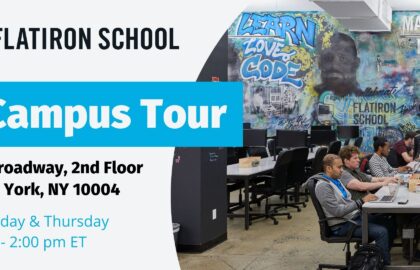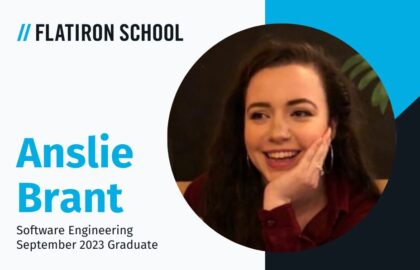Sometimes, you’re already on a career path you enjoy. And though you’re mostly satisfied, there’s still a part of you that wants to do more. Rahul Mody, before embarking on a coding career, felt exactly that way. He graduated Georgia Tech and was using the skills he learned in college as a data analyst at a startup. As a data analyst, Rahul spent most of his time working with Excel to help identify problems. However, he realized he liked the opportunities he had to work with code, and wanted to become a software engineer so he could start building things.Here’s Rahul as he discusses how he furthered his career with Flatiron School. Building off his existing technical skills, he attended Flatiron School and is now a full-fledged software engineer at a startup in Atlanta. In a matter of months, he went from a data career that he wasn’t totally happy with to a software engineering career with countless opportunities in Atlanta.
What did you do before Flatiron School?
I worked at a startup right after I graduated Georgia Tech where I was a data analyst.
Could you describe your technical background?
I graduated as an industrial engineer and even took a few programming classes, but I wasn’t by any means a proficient programmer. I could write code, but I couldn’t make an application or anything like that.
Why did you want to leave your previous job and join a bootcamp?
It was probably a long, and procrastinated, process. I was with the company for around a year and I was writing small bits of code, but it was mainly a lot of Excel work or communications and product-oriented stuff. What I really enjoyed the most was being able to sit down and write this bit of code that took what would be three or four hours in Excel into a five-minute job. We could then use that on a regular basis, keep it updated, and more organized.
But, I found that I would always have to ask for a dev’s help for something or I’d hit roadblocks along the way. So, started taking these programming classes by myself after work hours. I was learning R and Python. I worked my way up the pricing tiers into better and better curriculums. One day I thought, “You know what, I want to do this full-time.” I don’t want to just be a data engineer. I want to be a developer and build applications for customers directly.That’s how I started looking at coding bootcamps. I started looking around forums, reading about bootcamps online, reading people’s experiences. I visited Course Report that ranks all of them. I started applying to a number of them. I started doing interviews and a lot of it was me learning more about their culture.
What made you choose Flatiron School?
I really ended up liking Flatiron’s culture. I think it was the right for me. They were really focused on having a unique class. They weren’t looking for a specific type of person. Flatiron wanted a variety of people that can work together and have different backgrounds. I thought that was really valuable and I really liked the online curriculum. Flatiron spent a lot of time, money, and engineering resources on Learn.co and that showed, to me, their investment for online education.
What did you like about Flatiron School?
I always felt I controlled my own pace but, at the same time, I was constantly pushed to keep going and to keep learning. It’s really up to you how fast you want to go and what you want to focus on, but Flatiron is helping you toward this direction. And I really liked having someone push me. I liked being able to have direct access to someone who’s really knowledgeable. The ratio of students to teachers was really good.In general, I enjoyed the fact that everyone was unique. Flatiron was focused on having a variety of experience levels. There were some people who had some web development experience and there were some people who never wrote a line of code before they applied. I was somewhere in the middle. I was nowhere near a developer, but I was technical. One person was a banker. One person was a semi-professional poker player. One woman was an opera singer and powerlifter and bartender. There were so many interesting people and that really helped. Sometimes I felt like I had to be more of the driver when working in a group. Other times I would take a step back and say, “I could really learn from this person,” and I think everyone felt that way.
Did you feel prepared in your day-to-day duties after Flatiron?
I was hired because they were looking for someone with a data background and also was a software engineer. I wouldn’t have this job without Flatiron. Continuing forward with regular development, there’s no way I could have done any of that without Flatiron. We use Ruby on Rails here, which is the same language we learned at Flatiron School. That translated really well into being able to pick up and join the dev team and the knowledge to understand versioning and Git. All of that, in general, helped me smoothly transition into being a productive member of the team.




